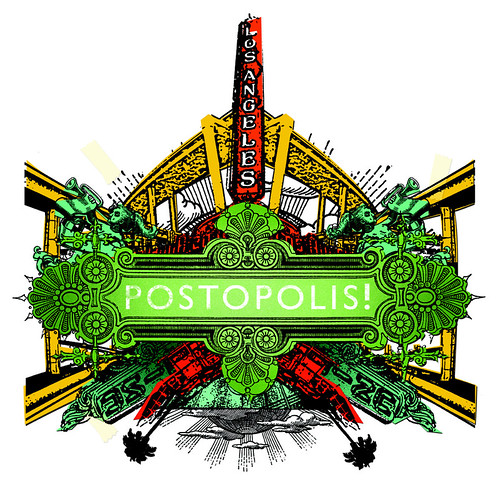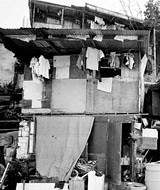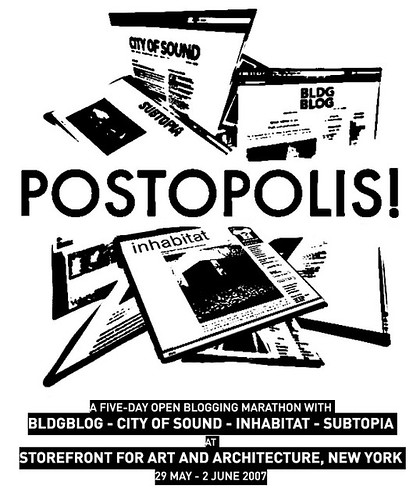Cities Made by War

[Fallujah, Occupation and Rule in Iraq]
A couple of weeks ago there was a discussion in NYC that I would loved to have atteneded: “Middle East Cities and War: Putting Iraq in Context,” with these wicked heads: Stephen Graham, Helga Tawil Souri, Adam Shatz, Zeynep Celik, and Oren Yifatchel.
So, what role does the geography of cities in the Mideast have in fomenting social change, democratic uprising, theocratic fortitude, fascist dictatorship, a U.S. brand military urbanism, or in just helping to author a good old fashioned run-on narrative of perpetual conflict? What skeletal imprints of ancient empire-building are evident in the modern transformation of these cities today? How are contemporary Arab cities becoming the future fossils of an 'empire urbanism'? Or, are they, perhaps, becoming the places of empire’s own self-destruction? What are cities like Fallujah, Najaf, Baghdad, Jerusalem, being turned into, coming to represent?
Well, I did find this little review in the Washington Square News.
In a previous post, I spouted something about the future downfall of ‘superpower’ (in a generic sense) coming partly at the behest of an “Achilles urbanism” (a subterranean, illicit, guerilla militarized, politically divided, global backlash landscape, or something...). Perhaps, echoing that notion, Yifatchel said while moderating the discussion, that “Cities are the Achille’s heel of the colonialist project”. By virtue of the constructs of the city, the image of the city, Zeynep Celik talked about how modern Baghdad has taken its cue from the Ottoman Empire in reacting to British colonial power that, not unlike American colonialism, Yifatchel described as “so convinced it’s right that it doesn’t know how to manage resistance.”
Shatz emphasized that as America's occupation continues to sink, groups like Hezbollah become more attractive to Arabs by creating its own social programming which "could serve as a shield for Iran’s nuclear activities from the U.S. and Israel.”
In a forthcoming article, Stephen Graham argues that Arab cities "have long been represented by Western powers as dark, exotic, labyrithine, and structureless places that need to be 'unveiled' for the production of 'order' through ostensibly superior scientific, planning and military technologies of the occupying West." Ultimatley, he talks about how these cities are being overwhelmingly constructed within 'war on terror' discourses as targets for U.S. military firepower.
At the conference, Graham iterated, “The ultimate nightmare of the U.S. military is [city warfare]. [...] The U.S. needs to be at a distance from its violence, and certain Arab cities that are interrupters of this fantasy of fighting from afar are the killjoy of the automated battlefield.” Sovereignty becomes software in a powerful way, Graham said, referring to (according to the article) the American military’s experiments with the use of robotics and other technologies to further distance soldiers from war.
Mike Davis has stated, “The battle of Fallujah, together with the conflict unfolding in Shia cities and Baghdad slums, are high-stakes tests, not just of U.S. policy in Iraq, but of Washington’s ability to dominate what Pentagon planners consider the ‘key battlespace of the future’ — the Third World city.”
So, what will these cities look like in 50 or 100 years? Will they further devolve into economic engines for imperialism, militarized slums, half preserved in ruins, perpetual conflict, urbicide, crumbled under the strategic weight of the Pentagon's networked battlespaces? Or, can the Third World help bring forth new models of an 'anti-imperialist urban regime', as this great article explores? Not just localized cities of resistance, or bunkers for an "urbanized insurgency", but post-imperial cities reinvented out of Empire in a new egalitarian form, beyond the inequal wealth distribution paradigm that cities have served through out history? What will the cities of a post-Empire landscape look like, how will they function, how will they be governed, and more interestingly, how will they emerge?







0 Comments:
Post a Comment
<< Home